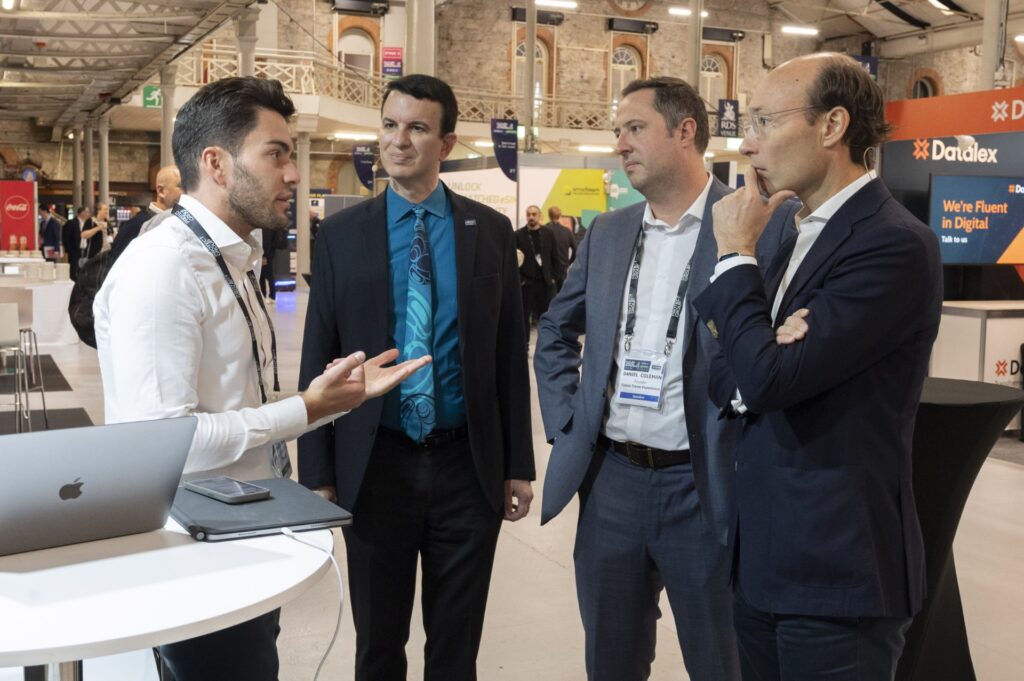FTE EMEA 2024: SAS CEO Shares Journey Towards Growth, Sustainability
Share

During a dynamic discussion that opened the Future Travel Experience (FTE) EMEA event in Dublin today, SAS’s President and CEO Anko van der Werff shared insights on the airline’s ambitious strategies and future plans. Interviewed by APEX Group CEO Dr. Joe Leader, Van der Werff delved into SAS’s impending transition to SkyTeam, sustainability goals and customer experience enhancements, emphasizing the carrier’s vision for growth and innovation.
SAS Transitions to SkyTeam
As SAS prepares to transition from Star Alliance to SkyTeam on September 1, van der Werff acknowledged the challenge of reorienting the airline’s long-time customers. The significant shift involves not just rebranding for SAS, but also operational realignment, including new routes and partnerships.
Van der Werff highlighted the strategic importance of the first SAS flight to Atlanta, set to commence next week. The route, along with others, aims to enhance connectivity in the US. “We’re moving partially from Newark to JFK, putting in more Boston flights, and expanding to Atlanta,” he said. Confirming that flights are filling well for the summer, van der Werff said a bigger challenge is maintaining success on the route, something he hopes will be made possible by increased collaboration with Delta. “Codeshares are not yet up and running with Delta, but they will be before we enter SkyTeam,” he continued.
SAS will also launch codeshares with fellow Skyteam members Air France, KLM and Virgin before September. “The best thing since sliced bread is SkyTeam,” van der Werff enthused.
Customer Experience and NPS Focus
Improving the customer experience is a core priority for SAS, with a particular focus on Net Promoter Score (NPS) as a measure of success. “We’re on our way to making NPS our holy grail,” Van der Werff said. He cited Delta’s approach as an inspiration, describing it as a “reverse-engineered NPS,” where investments are made based on what will most impact customer satisfaction.
“We’re on our way to making NPS our holy grail”
Anko van der Werff, SAS
Addressing the transformation of SAS, van der Werff emphasized the importance of distinguishing the airline as a premium carrier. “We’re seriously revamping our business class on European routes and investing in premium experiences,” something he said SAS’s current product offering doesn’t allow for. This will include significant improvements in in-flight entertainment, Wi-Fi connectivity and seat comfort, aiming to align SAS’ offerings with those of its SkyTeam partners.
Sustainability and Innovation
Sustainability is at the forefront of SAS’s long-term strategy. Van der Werff outlined its three-pillar strategy: Sustainable Aviation Fuel (SAF), electric aircraft and hydrogen-powered aviation. He expressed concern about the current pace of sustainable aviation development, emphasizing the need for substantial investment and cooperation.
“Everyone’s holding each other hostage. Nothing is happening because the investors are like, ‘Where’s this going?’ The airlines ask why they should pay more for SAF. We need someone to put a trillion dollars into this transition,” van der Werff argued. He also highlighted SAS’s involvement with Airbus on hydrogen aircraft development and infrastructure studies, as well as collaborations with startups focused on electric aviation.
Elsewhere, SAS is committed to tackling food waste, both from a cost-saving and moral perspective: “The food we throw away is obscene. We’ve introduced options for passengers to opt-out of meals, and we’re seeing a 6 percent opt-out rate on short-haul already,” he revealed. SAS is also exploring pre-selection of meals for long-haul flights to further reduce waste. In other catering-related news, van der Werff confirmed SAS is also going to introduce hamburgers, which he thinks will be very popular.

Operational Excellence and Load Factors
Operational efficiency will be another area of focus for the airline moving forward, with van der Werff showing pride in SAS’s improved load factors. “Our load factors have gone from the low 70s to the high 70s. We’re aiming for figures that start with an eight,” he stated. The improvement is attributed to a strategic shift in network planning, favoring popular sun destinations and optimizing flight schedules to better meet demand.
Digital Transformation and Technological Advancements
Apart from its sustainability and operational strategies, SAS is also investing heavily in digital transformation to enhance overall efficiency and passenger experience. Van der Werff highlighted the airline’s efforts to leverage cutting-edge technology, including artificial intelligence and data analytics, to streamline operations and personalize customer interactions. “Our app is among the best in the industry, offering a seamless interface for bookings, real-time updates, and personalized services,” he noted.
The airline is also exploring advanced in-flight connectivity solutions and innovative passenger amenities, ensuring that SAS remains at the forefront of technological advancements in the aviation sector. “The goal is to provide a connected, intuitive travel experience that exceeds customer expectations at every touchpoint,” van der Werff opined.
“Our people are our greatest asset, and their wellbeing is crucial to our overall performance”
Anko van der Werff, SAS
Commitment to Employee Wellbeing and Development
Beyond its external strategies, SAS is also deeply committed to fostering a positive and supportive work environment for its employees. Van der Werff emphasized the importance of investing in the workforce to drive the airline’s success. “Our people are our greatest asset, and their wellbeing is crucial to our overall performance,” he stated. SAS has implemented comprehensive training programs to enhance skills and career development opportunities, ensuring that employees are well-equipped to meet the demands of the evolving aviation industry.
Additionally, the airline has introduced various wellbeing initiatives, such as flexible working arrangements and mental health support services, to promote a healthy work-life balance. “We believe that a motivated and well-supported team will deliver the best service to our customers, which in turn drives our growth and success,” van der Werff concluded.

Future Vision
Looking ahead, van der Werff discussed how he envisions SAS as a leader in sustainable aviation and customer satisfaction. He hopes for technological breakthroughs in electric and hydrogen aviation within the next decade, transforming domestic and short-haul travel. “People want to travel and experience the world. They don’t want to be sardines. A seamless, connected travel experience is the future,” he asserted.
In conclusion, van der Werff’s interview at Future Travel Experience EMEA painted an encouraging picture of an airline poised for significant transformation. Through strategic partnerships, a focus on customer experience, and a strong commitment to sustainability, SAS is aiming to redefine its role in the global aviation industry. As van der Werff aptly summarized, “Our path will be challenging, but with focus and innovation, we are confident in our ability to lead and inspire change.”
Expressing Admiration for the FTE EMEA & Ancillary Innovations
During his visit to the co-located FTE EMEA and FTE Ancillary & Retailing events, van der Werff took the opportunity to walk the floor and engage with various exhibitors, particularly those focused on ancillary services. He expressed his enthusiasm for the innovative solutions being showcased, noting their potential to enhance the customer experience and operational efficiency. “Walking around this morning and talking to many of the startups was incredibly inspiring,” van der Werff said. “The creativity and ingenuity in ancillary services offer us new ways to personalize and improve our offerings for passengers. It’s about creating a seamless and enjoyable journey from start to finish.”


